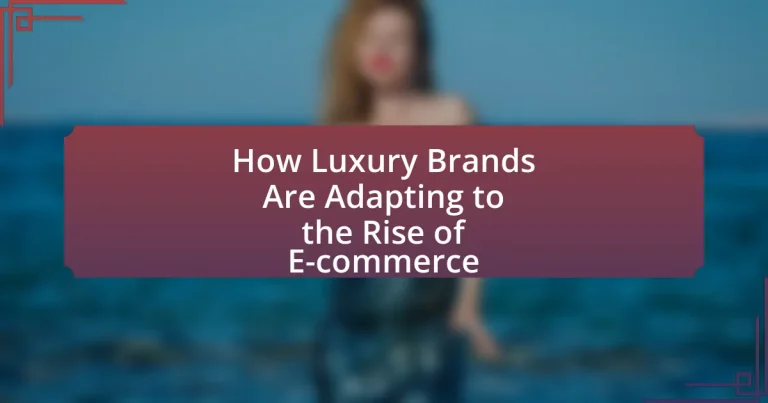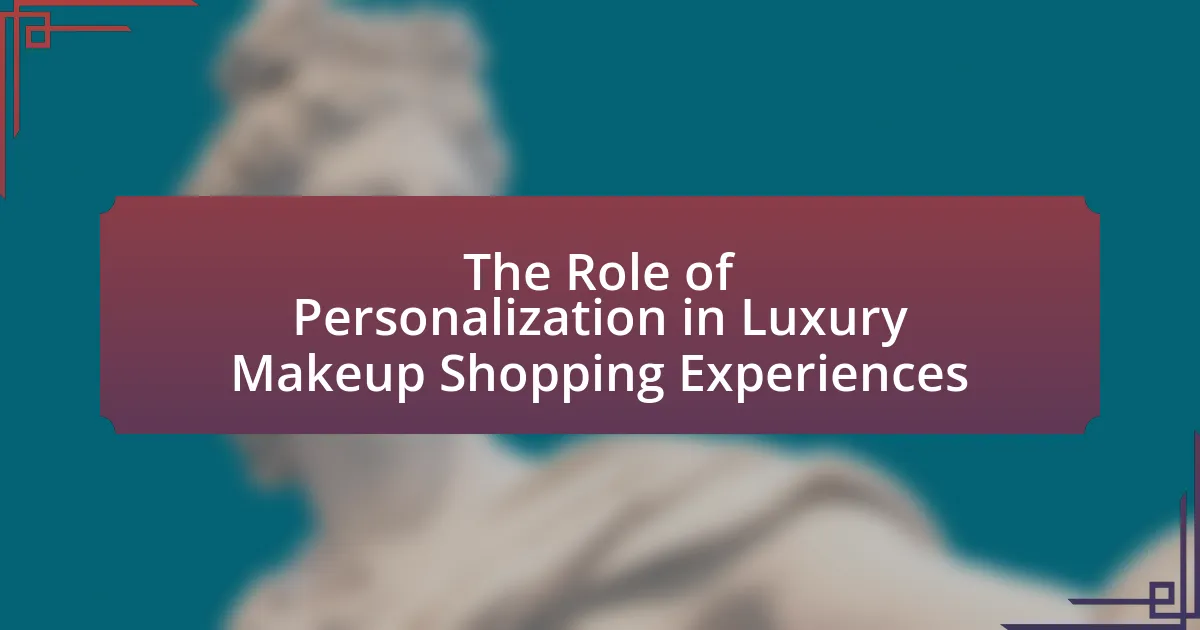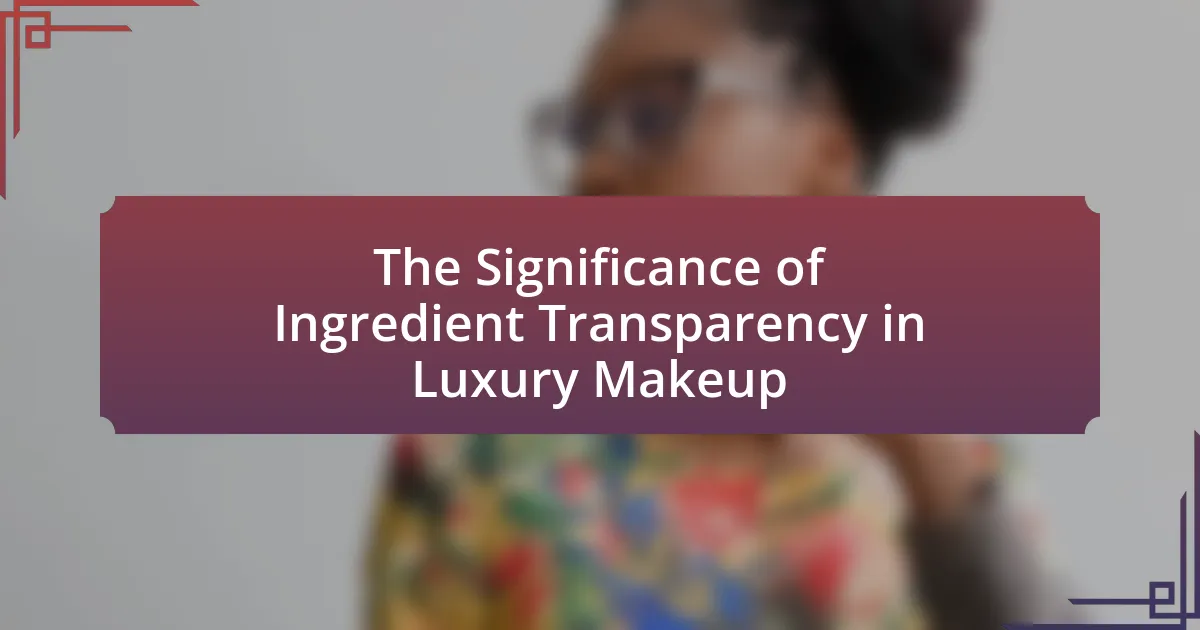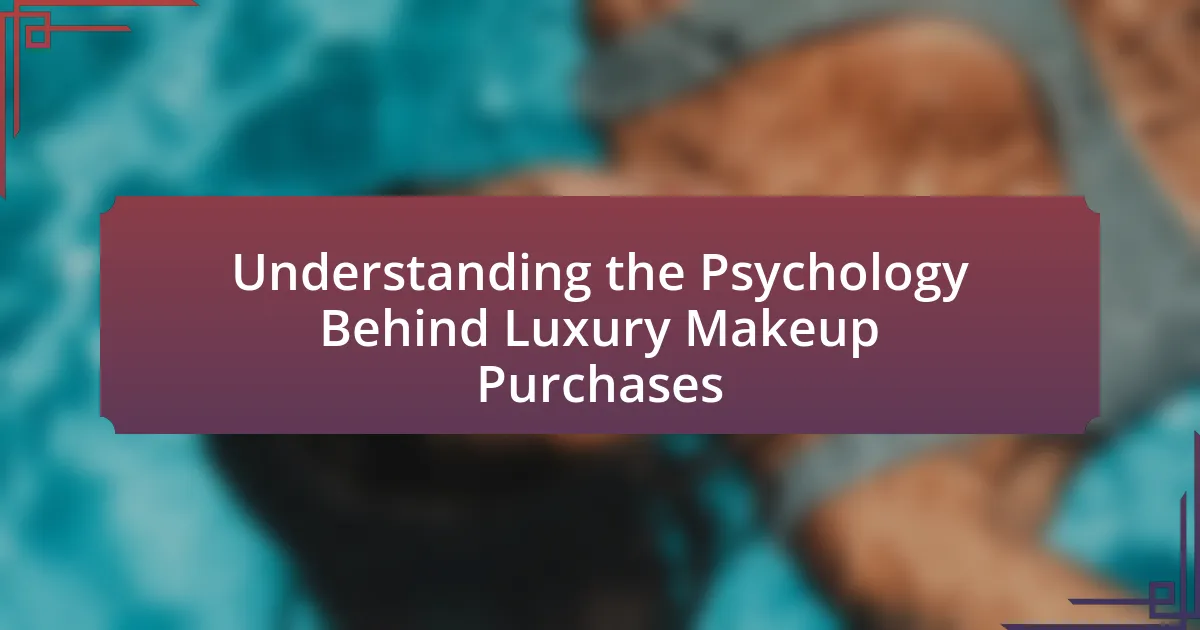Luxury brands are increasingly adapting to the rise of e-commerce by enhancing their online presence and implementing digital marketing strategies. This includes developing user-friendly websites, optimizing mobile shopping experiences, and utilizing social media for targeted advertising. However, they face challenges such as maintaining brand exclusivity, ensuring product authenticity, and delivering personalized customer service. Key trends in luxury e-commerce include personalization, sustainability, and the integration of advanced technologies like augmented reality and artificial intelligence. As the luxury e-commerce market is projected to grow significantly, brands are exploring innovative strategies to meet consumer expectations while preserving their exclusive appeal.
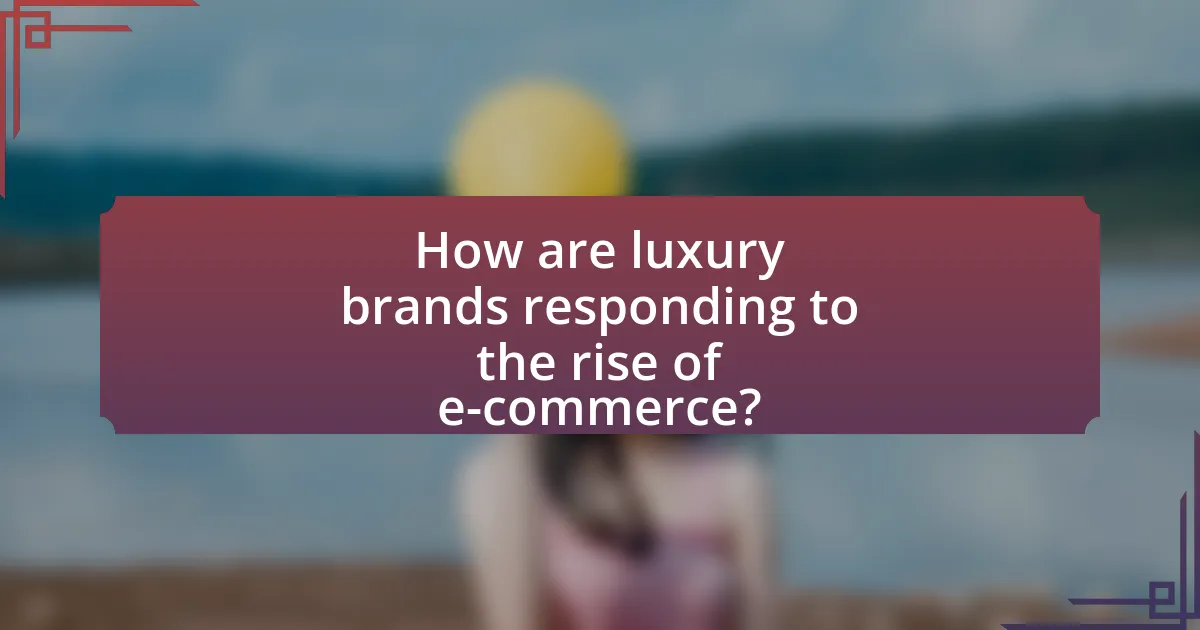
How are luxury brands responding to the rise of e-commerce?
Luxury brands are increasingly embracing e-commerce by enhancing their online presence and investing in digital marketing strategies. This shift includes developing user-friendly websites, optimizing mobile shopping experiences, and utilizing social media platforms for targeted advertising. For instance, brands like Gucci and Louis Vuitton have reported significant growth in online sales, with e-commerce accounting for over 20% of their total revenue in recent years. Additionally, luxury brands are leveraging data analytics to understand consumer behavior better and personalize shopping experiences, which has proven effective in attracting younger, tech-savvy customers.
What challenges do luxury brands face in the e-commerce landscape?
Luxury brands face significant challenges in the e-commerce landscape, primarily related to maintaining brand exclusivity and delivering a high-touch customer experience. The shift to online sales can dilute the perceived value of luxury products, as consumers may associate e-commerce with mass-market accessibility. Additionally, luxury brands struggle with ensuring product authenticity and combating counterfeiting, which is prevalent in online marketplaces. According to a report by the International Trademark Association, counterfeit goods account for approximately 3.3% of global trade, posing a substantial risk to luxury brands’ reputations. Furthermore, the need for personalized customer service online is critical, as luxury consumers expect tailored experiences akin to those in physical stores. This requires significant investment in technology and training, which can be a barrier for some brands.
How does the perception of luxury change in an online environment?
The perception of luxury changes in an online environment by becoming more accessible yet maintaining exclusivity through curated digital experiences. Online platforms allow luxury brands to reach a broader audience, which can dilute the traditional perception of exclusivity; however, brands counteract this by creating immersive online shopping experiences that emphasize storytelling, craftsmanship, and heritage. For instance, luxury brands like Gucci and Louis Vuitton utilize high-quality visuals and interactive content to convey their brand narratives, reinforcing their luxury status while engaging consumers. This dual approach of accessibility and exclusivity is supported by research from Bain & Company, which indicates that the luxury e-commerce market is expected to grow significantly, highlighting the importance of digital presence in shaping consumer perceptions of luxury.
What are the logistical hurdles for luxury brands in e-commerce?
Luxury brands face several logistical hurdles in e-commerce, primarily including inventory management, shipping complexities, and maintaining brand exclusivity. Inventory management is challenging due to the need for precise stock levels to meet high customer expectations without overstocking, which can lead to markdowns that undermine brand value. Shipping complexities arise from the necessity to provide fast, reliable delivery while ensuring that products are handled with care, as luxury items often require special packaging and handling. Additionally, maintaining brand exclusivity in an online environment is difficult, as luxury brands must balance accessibility with the desire to create a sense of scarcity and prestige, which can be compromised by widespread online availability. These hurdles are critical for luxury brands to address in order to successfully navigate the e-commerce landscape.
What strategies are luxury brands implementing to adapt to e-commerce?
Luxury brands are implementing several strategies to adapt to e-commerce, including enhancing their online presence, utilizing data analytics for personalized marketing, and creating exclusive online collections. By investing in high-quality websites and user-friendly interfaces, luxury brands ensure a seamless shopping experience that reflects their brand identity. Additionally, leveraging data analytics allows these brands to tailor marketing efforts to individual consumer preferences, thereby increasing engagement and sales. The introduction of exclusive online collections creates a sense of urgency and exclusivity, driving traffic to their e-commerce platforms. These strategies are supported by the fact that luxury e-commerce sales are projected to grow significantly, with a report from Bain & Company indicating that online luxury sales could account for 25% of the total luxury market by 2025.
How are luxury brands enhancing their online presence?
Luxury brands are enhancing their online presence by investing in high-quality digital experiences and leveraging social media platforms. These brands are creating visually appealing websites that reflect their luxury status, often incorporating advanced technologies like augmented reality to allow customers to virtually try on products. Additionally, luxury brands are utilizing social media influencers and targeted advertising to reach affluent consumers, with platforms like Instagram and TikTok being pivotal in showcasing their products. For instance, a report by McKinsey & Company indicates that luxury e-commerce sales are projected to grow by 70% to 80% by 2025, highlighting the importance of a robust online strategy for these brands.
What role does social media play in luxury e-commerce strategies?
Social media serves as a critical component in luxury e-commerce strategies by enhancing brand visibility and fostering direct engagement with consumers. Luxury brands utilize platforms like Instagram and Facebook to showcase their products through visually appealing content, which attracts a targeted audience and drives traffic to their online stores. According to a study by McKinsey, 70% of consumers in the luxury sector are influenced by social media when making purchasing decisions, highlighting its effectiveness in shaping consumer behavior. Additionally, social media allows luxury brands to create personalized experiences through targeted advertising and influencer partnerships, further solidifying their market presence and driving sales.
Why is personalization important for luxury brands in e-commerce?
Personalization is crucial for luxury brands in e-commerce because it enhances customer experience and fosters brand loyalty. Luxury consumers expect tailored interactions that reflect their individual preferences and lifestyles, which can significantly influence their purchasing decisions. According to a study by McKinsey, 71% of consumers expect companies to deliver personalized interactions, and this expectation is even higher among luxury shoppers who seek exclusivity and unique offerings. By leveraging data analytics and customer insights, luxury brands can create personalized marketing strategies, product recommendations, and tailored communications, ultimately driving higher engagement and conversion rates.
How do luxury brands use data to personalize the shopping experience?
Luxury brands utilize data analytics to personalize the shopping experience by analyzing customer behavior, preferences, and purchase history. This data-driven approach enables brands to tailor product recommendations, marketing messages, and promotional offers to individual customers. For instance, brands like Gucci and Burberry leverage customer data to create personalized online experiences, enhancing engagement and satisfaction. According to a report by McKinsey, 75% of luxury consumers expect personalized experiences, highlighting the importance of data in meeting these expectations.
What technologies are being utilized for personalization in luxury e-commerce?
Artificial intelligence (AI) and machine learning (ML) technologies are being utilized for personalization in luxury e-commerce. These technologies analyze consumer behavior, preferences, and purchase history to deliver tailored product recommendations and personalized shopping experiences. For instance, AI algorithms can segment customers based on their browsing patterns and purchase behaviors, enabling brands to create targeted marketing campaigns. Additionally, chatbots powered by AI provide personalized customer service, enhancing user engagement and satisfaction. According to a report by McKinsey, companies that effectively use AI for personalization can increase their sales by 10 to 30 percent, demonstrating the significant impact of these technologies in the luxury e-commerce sector.
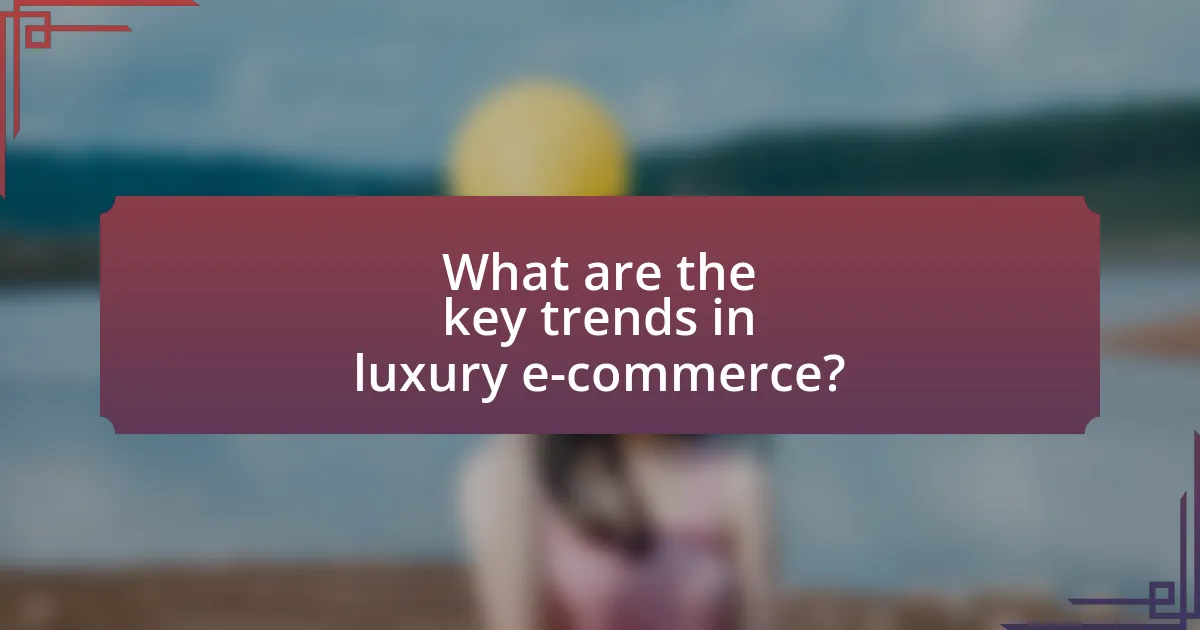
What are the key trends in luxury e-commerce?
Key trends in luxury e-commerce include personalization, sustainability, and the integration of augmented reality. Personalization is increasingly important, with 80% of consumers more likely to make a purchase when brands offer personalized experiences. Sustainability is also a significant trend, as 66% of global consumers are willing to pay more for sustainable brands. Additionally, augmented reality is enhancing the online shopping experience, with 61% of consumers preferring retailers that offer AR experiences. These trends reflect how luxury brands are evolving to meet consumer expectations in the digital marketplace.
How is mobile commerce impacting luxury brands?
Mobile commerce is significantly impacting luxury brands by enhancing their accessibility and customer engagement. Luxury brands are increasingly adopting mobile platforms to reach a broader audience, as mobile commerce accounted for 72.9% of total e-commerce sales in 2021, according to Statista. This shift allows luxury brands to provide personalized shopping experiences through mobile apps and optimized websites, catering to the preferences of tech-savvy consumers. Furthermore, the integration of mobile payment options and augmented reality features enables luxury brands to create immersive shopping experiences, driving higher conversion rates and customer loyalty.
What features are essential for luxury mobile shopping experiences?
Essential features for luxury mobile shopping experiences include high-quality visuals, personalized recommendations, seamless navigation, and secure payment options. High-quality visuals enhance product appeal, as luxury consumers expect detailed images and videos that showcase craftsmanship. Personalized recommendations leverage data analytics to tailor offerings to individual preferences, increasing engagement and satisfaction. Seamless navigation ensures that users can easily browse and find products without frustration, which is crucial for maintaining a premium shopping experience. Secure payment options build trust, as luxury consumers prioritize safety in transactions. These features collectively create an elevated shopping experience that aligns with the expectations of luxury brand clientele.
How do luxury brands optimize their websites for mobile users?
Luxury brands optimize their websites for mobile users by implementing responsive design, ensuring fast loading times, and enhancing user experience through intuitive navigation. Responsive design allows websites to adapt seamlessly to various screen sizes, which is crucial as mobile traffic accounts for over 50% of global web traffic. Fast loading times are achieved by optimizing images and minimizing code, as studies show that a one-second delay in loading can lead to a 7% reduction in conversions. Additionally, luxury brands focus on intuitive navigation, simplifying the purchasing process to cater to mobile users who prefer quick and easy access to products.
What role does sustainability play in luxury e-commerce?
Sustainability plays a crucial role in luxury e-commerce by influencing consumer purchasing decisions and brand reputation. Luxury brands are increasingly adopting sustainable practices, such as using eco-friendly materials and ethical sourcing, to meet the growing demand for environmentally responsible products. According to a 2021 McKinsey report, 67% of consumers consider sustainability when making luxury purchases, highlighting its importance in the market. Furthermore, luxury brands that prioritize sustainability often experience enhanced customer loyalty and differentiation in a competitive landscape, as consumers are more likely to support brands that align with their values.
How are luxury brands incorporating sustainable practices in their online operations?
Luxury brands are incorporating sustainable practices in their online operations by implementing eco-friendly packaging, optimizing supply chains for reduced carbon footprints, and utilizing digital platforms to promote transparency in sourcing. For instance, brands like Stella McCartney use biodegradable materials for shipping, while Gucci has committed to carbon neutrality in its supply chain by 2021. Additionally, luxury brands are increasingly adopting blockchain technology to provide consumers with verifiable information about the sustainability of their products, enhancing accountability and consumer trust.
What consumer expectations exist regarding sustainability in luxury e-commerce?
Consumers expect luxury e-commerce brands to prioritize sustainability through ethical sourcing, eco-friendly packaging, and transparent supply chains. Research indicates that 66% of global consumers are willing to pay more for sustainable brands, highlighting a significant demand for environmentally responsible practices. Additionally, luxury consumers increasingly seek brands that demonstrate a commitment to social responsibility, with 75% of millennials stating they would switch to a brand that supports sustainability. This expectation drives luxury brands to innovate and adopt sustainable practices to meet consumer demands and enhance brand loyalty.
How are luxury brands leveraging influencer marketing in e-commerce?
Luxury brands are leveraging influencer marketing in e-commerce by collaborating with high-profile influencers to enhance brand visibility and drive sales. These brands strategically select influencers whose personal brands align with their luxury image, thereby reaching targeted audiences effectively. For instance, a study by McKinsey & Company found that 70% of consumers are influenced by recommendations from peers, which underscores the effectiveness of influencer partnerships in shaping purchasing decisions. Additionally, luxury brands utilize social media platforms like Instagram and TikTok to showcase products through curated content, creating a sense of exclusivity and desirability that resonates with consumers. This approach not only boosts online engagement but also translates into higher conversion rates, as evidenced by a report from the Influencer Marketing Hub indicating that businesses earn an average of $5.78 for every dollar spent on influencer marketing.
What criteria do luxury brands use to select influencers?
Luxury brands select influencers based on criteria such as audience alignment, engagement rates, brand image compatibility, and authenticity. Audience alignment ensures that the influencer’s followers match the target demographic of the luxury brand, which is crucial for effective marketing. Engagement rates are assessed to determine how actively the influencer’s audience interacts with their content, as higher engagement often leads to better conversion rates. Brand image compatibility is vital; luxury brands seek influencers whose personal brand reflects the values and aesthetics of the luxury label. Lastly, authenticity is critical; brands prefer influencers who maintain genuine connections with their audience, as this fosters trust and credibility. These criteria are supported by industry reports indicating that influencer marketing can yield up to 11 times the ROI of traditional advertising when these factors are considered.
How does influencer marketing affect brand perception in luxury e-commerce?
Influencer marketing significantly enhances brand perception in luxury e-commerce by leveraging the credibility and reach of influencers to create aspirational associations with luxury brands. Research indicates that 70% of millennials are influenced by the recommendations of their peers, including social media influencers, which can lead to increased brand trust and desirability. Furthermore, luxury brands that collaborate with influencers often experience a boost in perceived exclusivity and prestige, as influencers curate content that aligns with the brand’s image, thereby reinforcing its luxury status. This strategic alignment not only attracts a wider audience but also fosters a deeper emotional connection with consumers, ultimately enhancing brand loyalty and driving sales in the competitive luxury e-commerce landscape.
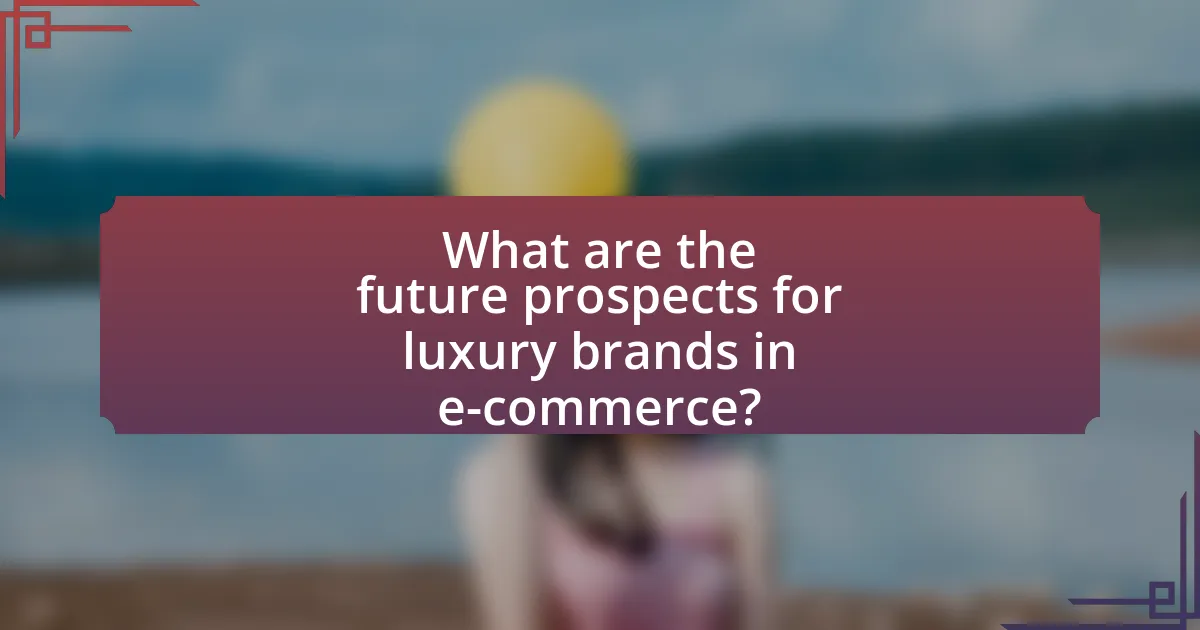
What are the future prospects for luxury brands in e-commerce?
The future prospects for luxury brands in e-commerce are highly promising, driven by increasing digital adoption and consumer demand for online shopping experiences. According to a report by Bain & Company, the luxury e-commerce market is expected to grow by 20% annually, reaching approximately 25% of the total luxury market by 2025. This growth is fueled by younger consumers who prioritize convenience and personalized shopping experiences, leading luxury brands to invest in advanced digital strategies, including augmented reality and artificial intelligence, to enhance customer engagement. Additionally, the integration of social media platforms for direct sales is becoming a key strategy, as evidenced by the rise of luxury brands utilizing Instagram and TikTok for marketing and sales.
How will technology shape the future of luxury e-commerce?
Technology will significantly shape the future of luxury e-commerce by enhancing personalization, improving customer experience, and streamlining operations. Advanced data analytics and artificial intelligence will enable luxury brands to offer tailored recommendations and personalized shopping experiences, which are crucial for attracting high-end consumers. For instance, a report by McKinsey & Company indicates that personalization can lead to a 10-30% increase in revenue for luxury brands. Additionally, augmented reality (AR) and virtual reality (VR) technologies will allow customers to experience products in immersive ways, bridging the gap between online and in-store shopping. Furthermore, blockchain technology will enhance transparency and authenticity in luxury goods, addressing concerns about counterfeiting. According to a study by Deloitte, 57% of luxury consumers are willing to pay more for products that are verified as authentic, highlighting the importance of technology in building trust.
What emerging technologies are luxury brands exploring for e-commerce?
Luxury brands are exploring augmented reality (AR), artificial intelligence (AI), and blockchain technology for e-commerce. AR enhances the online shopping experience by allowing customers to visualize products in their environment, which can lead to increased engagement and conversion rates. AI is utilized for personalized recommendations and customer service chatbots, improving user experience and operational efficiency. Blockchain technology is being investigated for its potential to enhance transparency and traceability in supply chains, which is increasingly important to consumers. These technologies are reshaping how luxury brands connect with customers and streamline their e-commerce operations.
How might virtual reality and augmented reality change luxury shopping experiences?
Virtual reality (VR) and augmented reality (AR) will significantly enhance luxury shopping experiences by providing immersive and interactive environments that allow customers to engage with products in novel ways. VR can create fully virtual showrooms where shoppers can explore high-end items without physical limitations, while AR can overlay digital information onto real-world products, enabling customers to visualize how luxury items fit into their lives. For instance, a study by Deloitte found that 40% of consumers are willing to pay more for a product if they can experience it through AR or VR, indicating a strong market potential for these technologies in luxury retail. This integration not only elevates customer engagement but also fosters a deeper emotional connection to the brand, ultimately driving sales and customer loyalty.
What best practices should luxury brands follow in e-commerce?
Luxury brands should prioritize personalized customer experiences in e-commerce. This involves utilizing data analytics to tailor product recommendations and marketing messages to individual preferences, enhancing customer engagement and satisfaction. According to a study by McKinsey, personalized experiences can lead to a 10-30% increase in sales, demonstrating the effectiveness of this approach. Additionally, luxury brands should ensure high-quality visuals and detailed product descriptions to convey the exclusivity and craftsmanship of their products, as research indicates that 67% of consumers consider image quality very important when making a purchase decision online. Finally, maintaining a seamless omnichannel experience is crucial, allowing customers to transition smoothly between online and offline interactions, which can increase brand loyalty and retention.
How can luxury brands maintain exclusivity while selling online?
Luxury brands can maintain exclusivity while selling online by implementing selective distribution strategies and creating personalized shopping experiences. Selective distribution involves limiting the availability of products to specific online platforms or exclusive brand websites, ensuring that not all consumers have easy access to luxury items. For instance, brands like Chanel and Gucci often sell their products through their own e-commerce sites or select high-end retailers, which helps control brand perception and maintain exclusivity.
Additionally, personalized shopping experiences, such as virtual consultations and tailored recommendations, enhance customer engagement and reinforce the luxury brand’s image. According to a study by Bain & Company, the luxury market is expected to grow by 6% to 8% annually, indicating that luxury brands can successfully adapt to e-commerce while preserving their exclusive appeal through these strategies.
What customer service strategies are essential for luxury e-commerce success?
Personalized customer service is essential for luxury e-commerce success. Luxury brands must focus on creating tailored experiences that cater to individual customer preferences and needs. This can be achieved through advanced data analytics to understand customer behavior, enabling brands to offer personalized recommendations and communications. According to a study by McKinsey, 71% of consumers expect companies to deliver personalized interactions, highlighting the importance of customization in enhancing customer satisfaction and loyalty in the luxury sector. Additionally, providing exceptional after-sales support, including easy returns and dedicated customer service representatives, reinforces the luxury experience and builds long-term relationships with clients.
What common pitfalls should luxury brands avoid in e-commerce?
Luxury brands should avoid diluting their exclusivity in e-commerce. This can occur when brands over-distribute their products online, leading to a loss of perceived value and prestige. For instance, a study by Bain & Company indicates that luxury brands that maintain a selective distribution strategy see a 20% higher brand equity compared to those that do not. Additionally, failing to provide a premium online shopping experience can alienate customers; research shows that 70% of luxury consumers expect a seamless, high-quality digital experience that mirrors in-store service. Lastly, neglecting to engage with customers through personalized marketing can result in missed opportunities, as 80% of luxury consumers prefer tailored communications.
How can luxury brands ensure brand integrity in online sales?
Luxury brands can ensure brand integrity in online sales by implementing strict control over their distribution channels and maintaining a consistent brand image across all platforms. By partnering exclusively with authorized retailers and utilizing direct-to-consumer models, luxury brands can prevent unauthorized sales that dilute their brand value. Research indicates that 70% of luxury consumers prefer purchasing from official brand websites, highlighting the importance of a controlled online presence. Additionally, luxury brands should invest in high-quality digital content and customer service to reinforce their premium positioning, as studies show that 80% of consumers associate brand integrity with the quality of online interactions.
What mistakes have luxury brands made in their e-commerce strategies?
Luxury brands have made several mistakes in their e-commerce strategies, primarily by underestimating the importance of digital presence and failing to optimize user experience. Many luxury brands initially approached e-commerce with skepticism, believing that it could dilute their exclusivity, which led to delayed online launches and inadequate investment in digital marketing. Additionally, some brands have neglected mobile optimization, resulting in poor user engagement; for instance, a study by Adobe found that 50% of luxury shoppers prefer mobile devices for browsing. Furthermore, luxury brands often lack personalized customer experiences online, which is crucial in retaining high-value customers; research indicates that 80% of consumers are more likely to make a purchase when brands offer personalized experiences. These missteps have hindered their ability to compete effectively in the growing e-commerce landscape.
